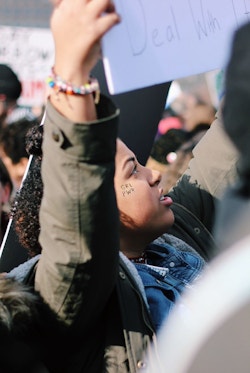Those women who made history
“I am of Generation Equality: Stand up for women’s rights! ” This is the theme chosen by the United Nations (UN) for the 2020 edition of International Women’s Day.
It is celebrated in many countries around the world this Sunday, March 8. It is an opportunity to pay tribute to some of the great women who have made history. And have shown us the way towards the achievement of several Sustainable Development Goals (SDOs). Victorien Erussard, Captain and Founder of Energy Observer, has been appointed as the first French ambassador.

Women's Right Demonstration
Mother Teresa
SDG 1 - No poverty
Mother Teresa (1910-1997) is without doubt the woman best known for her commitment and actions with the poor, the sick, the abandoned and the dying. At the time of her death, Missionaries of Charity continue to work on her behalf in 123 countries around the world.
Yet, the United Nations reports that 783 million people still live below the international poverty line today.
Agnodice
SDG 3 - Good health and well-being
The history of Agnodice (circa 300 BC) is emblematic of the history of women and draws our attention to sustainable development goal No. 3.
In order to access studies, she disguises herself as a man. And she becomes the first woman doctor and gynaecologist in history.
It is thanks to her that the Council of Athens finally allows women to study medicine.
Malala Yousafzai
SDG 4 - Quality education
It was an assassination attempt by the Taliban that made Malala Yousafzai (1997 – …) famous in 2012. An assassination attempt that she owes to her commitment to girls’ education in Pakistan. A commitment that resonates with sustainable development goal 4. Two years later, at only 17 years old, she is the youngest Nobel Peace Prize winner.
The NGO Plan International reports that 1 in 4 girls in developing countries still do not go to school.
Cecilia Payne
SDG 5 - Gender equality
The story of Cecilia Payne (1900-1979) is extraordinary. From a very young age, she was passionate about astronomy. But in her time in England, research posts were not open to women. She therefore took the helm in the United States and became the first woman to be appointed as a full-time professor at Harvard University. Among other things, she discovered that stars are 98% hydrogen and helium.
But the famous professor Henry Russell dissuaded her from publishing this result. Later, he himself published a paper on the subject, claiming that he was the one who made the discovery.
Rosa Parks
SDG 10 - Reduced inequalities
In 1955, Rosa Parks (1913-2005) caused a sensation by refusing to give a white man a seat on a bus. An action that triggered a revolt against segregation. And is fully in line with sustainable development goal no. 10.
Ellen MacArthur
SDG 12 - Responsible consumption and production
Ellen MacArthur (1976 – …) is a committed sailor. In 2005, she broke the solo round-the-world sailing record. A little later, she created her foundation with the aim of building a sustainable future based on a circular economy model.
The foundation now works with several major groups – such as Danone, Google, Philips and Renault – to implement concrete actions in this area.

Wangari Maathai
SDG 15 - Life on land
Wangari Maathai (1940-2011) is a Kenyan professor and environmental activist. In 1977, she founded the Green Belt Movement, which encourages people, especially women, to plant trees to combat environmental degradation. A movement that is very much in line with sustainable development goal No. 15.
But the UN tells us that between 2010 and 2015, the world lost 3.3 million hectares of forest area. A loss that particularly affects women in rural areas, who depend on the resources that forests offer. This loss is also harmful to the environment, since forests are home to more than 80% of the species on our planet.
Shirin Ebadi
SDG 16 - Peace, justice and strong institutions
In 1974, Shirin Ebadi (1947 – …) became the first woman judge in Iran. Since the Islamic revolution, she has worked to defend the rights of women and children in this ultra-conservative Islamic society. She has often provided legal aid to those persecuted by the Iranian regime. And she was awarded the Nobel Peace Prize in 2003.
Her commitment makes sense when you consider that the proportion of people in detention without conviction has remained almost constant around the world over the past decade.
UN figures speak of 31 per cent of all detainees.
